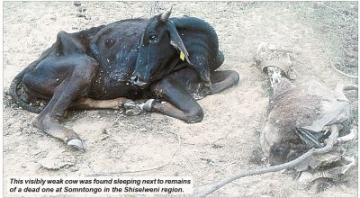DROUGHT KILLS 500 CATTLE IN LAVUMISA

MANZINI – The severe drought that has hit the country has killed about 500 cattle in Lavumisa and surrounding areas since the beginning of the year.
This was revealed by Musa Zwane of Somntongo, who coordinates between the Shiselweni region and the Swaziland Economic Justice Network (SEJUN), a non-governmental organisation (NGO) which had visited some of the areas which were first to be affected by the drought.
Zwane said since the beginning of the year, he lost a total of 16 cattle because of the drought. He said there other homes which lost more cattle than him.
“The rivers started drying up during the month of February this year as we last had rain in December 2014. There is also no grass in areas like Somntongo, Zindwendweni, Matsanjeni and Sigwe among other places,” Zwane said. He said an estimated 500 cattle had died in the aforementioned areas since the beginning of the year.
He said most farmers took the situation lightly when their cattle died one by one but recently, as the cattle were dying in multiple numbers, the people started taking the drought seriously. He said unfortunately for them, there was little or nothing they could do with the situation now.
“Like I said, the main river; Ngovuma, which we share with Matsanjeni, Somntongo and Sigwe communities, had dried up. The other small rivers dried up a while ago and we had been forced to share Ngovuma River with our livestock. The situation is expected to be worse because the river had completely dried up, and livestock like donkeys and goats were also dying,” he said.
On another note, Zwane said there were farms which used to be helpful to them before they were taken by Tibiyo TakaNgwane. He said they used to graze their cattle in the farms during such times but since Tibiyo TakaNgwane took over, only the organisation’s cattle were allowed into the farms.
“One farm is in Lavumisa while others are at Nsalitje and Zindwendweni. We usually see government trucks ferrying bales and water tanks to the farms for the Tibiyo TakaNgwane cattle,” Zwane said. He said their plea to government was that it should at least provide them with water and bales of grass in order to save the remaining livestock.
Again, Mbali Dludlu, the SEJUN Information Campaigns Officer, called upon government to assist the affected communities by subsidising water and bales so that they could save their livestock. She said recently, government warned the affected communities not to touch the livestock with their hands but did not supply them with gloves. She suggested that the government should visit the affected areas in order for it to obtain first-hand information.




 del.icio.us
del.icio.us Digg
Digg
Comments (0 posted):